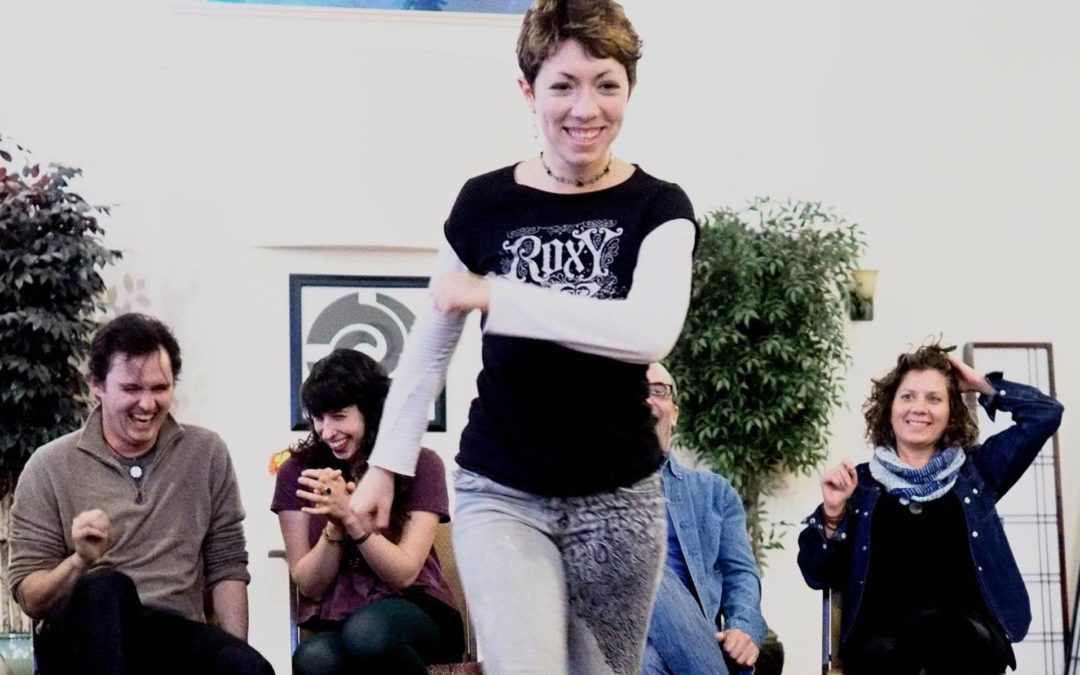Stop me if you’ve heard this one.
A woman walks into a workshop. There’s a line of chairs facing a stage, where a single person sits. She finds a chair and waits to receive.
She’s come to inform her life, and she’s hoping that some part of what the person on stage says will be relevant to her experience or will even recognize her unique reality.
There’s nothing odd about this picture. We’ve all been there: perhaps in a classroom listening to a teacher, or perhaps in a coaching seminar. We learn from others. Yet – something about this picture has always rubbed me the wrong way. If all of us hold some piece of the truth, why are we turning to the person on stage, rather than to each other or ourselves?
I’ve been experimenting on leadership.
I hold weekend workshops for facilitators who want to work with more empathy and vulnerability. I love being listened to. I could pontificate for hours on leadership strategies, systems theory, facilitation techniques, or how to get a roomful of engineers to care about emotions.
But, cool as my own voice is, I don’t think it’s the best way to teach people, because we listen best to our own wisdom. The question then is: How can we use leadership to bring forth others’ gurus?
I’ve realized that my main value, as a leader, rests in how much I can create space for others to lead.
Why?
First of all, creativity comes from evolution.
I learn and discover new things by creating with others. When I’m leading alone, I might be surprised by what I say, but the ideas all come from my own brain. The only new conversation is between my hemispheres. If I involve everyone in the leadership process, I get evolution – the process of multiple voices combining and reacting to form a new thing.
Second, solo leadership is lonely.
I like being looked up to. If I’m the guru, people want me around. They like listening to me talk. My inner 10-year old LOVES that.
But, I also get put in a box of expectation. I’d better live up to the image others have of me, or I won’t be liked, followed, or accepted. My image gets contacted – not me. This becomes lonely over time.
Third, I don’t want to be the only leader in the world.
There are a lot of issues out there. There are a lot of issues in our own lives. If I’m the only one who knows how to pick up the leadership-stick and take action, I’ve got a LOT of work to do. I have enough on my plate just dealing with the problems I choose to take on. I want to know that others are feeling confident to handle the rest.
So…
Imagine the scenario I set at the beginning: The woman comes in and sits down. The leader is at the front of the room. A one-way transfer of knowledge seems like it’s about to occur.
But then…
The first words the leader says are, “Welcome to this workshop. What do YOU want to happen?”
And then she steps down from the podium. And she says,
“The space is open. I’m here if you need me. What do YOU want to create?”
She finds a seat among the group. And one by one, people begin to step up to the stage…
This has been happening in the workshops I lead. This has been happening in communities, businesses, and groups across the world. A new model of leadership is emerging: leadership by example, openness, and abdication, rather than direction or delegation.
This leader creates the space for others to lead. He/she provides honest feedback, is open about his/her own humanity, and gives back any power that others try to give away. When asked to solve a problem, this leader says: “Let’s talk through how you would solve it.” When told about an issue, this leader says, “I’m here for you. What do you want to do?”
There’s a quote I love from the Tao Te Ching.
When the Master governs, the people
are hardly aware that he exists.
Next best is a leader who is loved.
Next, one who is feared.
The worst is one who is despised.
If you don’t trust the people,
you make them untrustworthy.
The Master doesn’t talk, he acts.
When his work is done,
the people say, “Amazing:
we did it, all by ourselves!”
I don’t want to be the voice at the front of the room. I want to be the air that people breathe, the hand on their back, the first to reveal myself. I want to give up my power. Only then do I understand that the greatest power I have is being open to receive.

